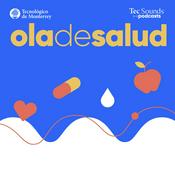65 episodios
- "I have come across allergists in different countries who often don't even prescribe epinephrine for very young children that have only had a history of mild reactions." — Dr. Katherine Anagnostou
An inconsolable cry. A baby who's just not acting right. Tongue thrusting. Lip licking. Scratching at their own tongue. These aren't the symptoms that make it into standard diagnostic criteria — but they might be the clearest signal a non-verbal child can give. On this episode, Dr. Mariam Hanna is joined by pediatric allergist and immunologist Dr. Katherine Anagnostou to explore how anaphylaxis presents in infants and toddlers, why the standard criteria don't always apply, and how allergists can help caregivers recognize — and treat — serious reactions in children who can't yet put words to what they're feeling.
On this episode:
Why modified criteria for infant and toddler anaphylaxis matter
Behavioral signs like irritability, clinginess, lethargy, or withdrawal as red flags
The role of context and timing in recognizing reactions
Surrogate symptoms — tongue thrusting and lip licking for oral itching, drooling, horse cry
Why urticaria shows up in 90% of infant anaphylaxis cases
Epinephrine dosing: the 0.1 mg option for infants 7.5-15 kg and safety of 0.15 mg in smaller babies
Why not every infant who receives epinephrine needs the ED
Second-dose timing: five minutes, not ten
Novel delivery routes on the horizon — intranasal and sublingual epinephrine
Dr. Anagnostou returns to one principle throughout: parents generally know their children pretty well. The job of the allergist isn't to create fear or overcomplicate recognition — it's to help families spot what's different, understand the context, and feel equipped to act when it matters.
Have an idea for the show or a comment, send us a text!
Visit the Canadian Society of Allergy and Clinical Immunology
Find an allergist using our helpful tool
Find Dr. Hanna on X, previously Twitter, @PedsAllergyDoc or CSACI @CSACI_ca
The Allergist is produced for CSACI by PodCraft Productions - “There is nothing magical that happens in your gut that says, ‘oh, now you’re ready for cow’s milk.’ — Dr. Farah Khan
Milk has a special talent for creating chaos in clinic. One day it’s mucousy stools and a terrifying diaper photo, the next it’s hives after yogurt, delayed vomiting with lethargy, or a family that’s been dairy-free for years with no improvement in eczema. On this episode, Dr. Mariam Hanna is joined by pediatric allergist and clinical immunologist Dr. Farah Khan to walk through the many ways “milk problems” show up — and how allergists can avoid overdiagnosis, unnecessary testing, and prolonged elimination diets that may do more harm than good.
On this episode:
Why allergic proctocolitis (cow’s milk protein intolerance) is often overdiagnosed
When skin testing and IgE testing are useful
Understanding the difference in lactose intolerance
How baked milk can be used to improve quality of life in IgE-mediated milk allergy
What makes FPIES to milk tricky, including earlier-than-expected reactions
Why dairy elimination for eczema or EOE needs caution and frequent reassessment
Across each of these scenarios, Dr. Khan returns to the same principle: eliminating dairy should never be a one-and-done decision. Revisiting the diagnosis, retrying thoughtfully, and weighing quality of life alongside risk are essential — especially when prolonged avoidance can set the stage for the very allergy clinicians are trying to prevent.
Have an idea for the show or a comment, send us a text!
Visit the Canadian Society of Allergy and Clinical Immunology
Find an allergist using our helpful tool
Find Dr. Hanna on X, previously Twitter, @PedsAllergyDoc or CSACI @CSACI_ca
The Allergist is produced for CSACI by PodCraft Productions - “It’s not about knowing each one. It’s about knowing the patterns, the warning signs, the general pathways, and knowing when to ask a friend when you’re a little bit lost.” —Dr. Tamar Rubin
On this episode of The Allergist, Dr. Mariam Hanna turns the focus to how allergists LEARN to recognize when common presentations may signal a deeper immune problem — and how that diagnostic instinct is built, taught, and sustained.
She’s joined by Tamar Rubin, pediatric allergist and clinical immunologist, Assistant Professor at the University of Manitoba, and a national leader in immunology education. Dr. Rubin makes the case that inborn errors of immunity are not a fringe interest, but central to understanding immunology across allergy, asthma, infection, and biologic therapies — and that allergist-immunologists are the specialists uniquely trained to recognize and teach this.
On this episode, they discuss:
Why allergist-immunologists “own” inborn errors of immunity, and why teaching these conditions is part of the specialty’s responsibility
Moving trainees away from memorizing rare syndromes and toward recognizing immune pathways, patterns, and warning signs
How patient-based teaching, case discussions, OSCEs, and national academic half-day curricula help trainees develop diagnostic “spidey sense”
What happens when you build dedicated immunology clinics, and how volume and exposure increase once you start looking
The importance of national collaboration and collegial networks when managing ultra-rare immune conditions
Practical ways allergists in community practice can stay engaged with inborn errors of immunity, even with limited volume or access to specialized testing
Knowing when — and how — to ask for help matters as much as knowing the diagnosis.
Because in the end, inborn errors of immunity aren’t just about rare diseases. They sharpen how allergists think, teach, and listen when the immune story doesn’t quite fit.
Have an idea for the show or a comment, send us a text!
Visit the Canadian Society of Allergy and Clinical Immunology
Find an allergist using our helpful tool
Find Dr. Hanna on X, previously Twitter, @PedsAllergyDoc or CSACI @CSACI_ca
The Allergist is produced for CSACI by PodCraft Productions - Keeping up with the allergy literature can feel like a second job layered onto an already full clinic day. Between evolving guidelines, expanding biologic options, and long-held assumptions quietly being challenged, it’s hard to know which papers are worth slowing down for. This episode takes a deliberately selective approach. Dr. David Khan — chair of the American College of Allergy, Asthma, and Immunology literature review — walks through five papers from 2025 that stood out not because they were flashy, but because they asked practical questions allergists actually wrestle with in clinic.
Timing of repeat epinephrine to inform pediatric anaphylaxis observation periods: a retrospective cohort study
For most children treated with epinephrine, prolonged emergency department observation may be unnecessary, with two hours appearing sufficient unless cardiovascular features are involved.
Two-year data of tapered dupilumab shows high effectiveness in chronic rhinosinusitis with nasal polyps with NSAID-exacerbated respiratory disease
In real-world practice, most patients with CRSwNP maintained excellent control while spacing dupilumab doses far beyond every two weeks, challenging long-term fixed dosing assumptions.
Remibrutinib and chronic spontaneous urticaria
This trial marks a major shift for CSU, introducing an oral, targeted option that delivers rapid symptom control and meaningful rates of complete remission.
A randomized trial comparing direct challenges to penicillin skin testing for outpatient low-risk penicillin allergy evaluations in pregnancy
For pregnant patients with low-risk penicillin allergy histories, direct oral challenge proved safe, efficient, and more streamlined than traditional skin testing.
Age differences in inducible laryngeal obstruction in adult populations
Inducible laryngeal obstruction appears common in older adults, often presents more subtly, and frequently masquerades as asthma or anaphylaxis.
Taken together, these papers reflect a broader shift in allergy care: less reflexive caution, more precision, and a growing willingness to question long-standing habits when better data emerge. Whether it’s shortening observation times, tapering biologics, simplifying drug allergy evaluations, or recognizing long-ignored mimics of allergic disease, the 2025 literature nudges allergists toward care that is more precise, less reflexive, and still clinically vigilant.
Have an idea for the show or a comment, send us a text!
Visit the Canadian Society of Allergy and Clinical Immunology
Find an allergist using our helpful tool
Find Dr. Hanna on X, previously Twitter, @PedsAllergyDoc or CSACI @CSACI_ca
The Allergist is produced for CSACI by PodCraft Productions - == Happy holidays to our audience around the world! As a gift, and a break for The Allergist team, we are replaying our most popular episode from 2025. We hope you enjoy it as much this time around. See you in the New Year! ==
“We have to keep in mind that urticaria has to be treated until it's completely gone. So, absolute control of the disease.” — Dr. Hermenio Lima
Chronic spontaneous urticaria has long been managed with the goal of complete symptom control. But for many patients, that goal remains elusive. In this episode of The Allergist, Dr. Mariam Hanna talks with dermatologist and clinical immunologist Dr. Hermenio Lima about the updated urticaria guidelines—and how new treatment options are giving clinicians more ways to act, and more hope for getting patients all the way to control.
On this episode:
What’s new in the 2025 guideline—including additional second-line options beyond antihistamines
Why nearly 40% of patients may need to escalate to biologics
How remibrutinib compares to omalizumab and what its trials revealed
What the CUPID studies say about dupilumab, especially in biologic-naive patients
Key safety signals and clinical considerations for the new treatment options
How to move toward full disease control—and why suboptimal outcomes are no longer acceptable
Complete control is still the destination, but the path to get there is about to get a lot more flexible.
Have an idea for the show or a comment, send us a text!
Visit the Canadian Society of Allergy and Clinical Immunology
Find an allergist using our helpful tool
Find Dr. Hanna on X, previously Twitter, @PedsAllergyDoc or CSACI @CSACI_ca
The Allergist is produced for CSACI by PodCraft Productions
Más podcasts de Salud y forma física
Podcasts a la moda de Salud y forma física
Acerca de The Allergist
Welcome to your allergy lifeline..."The Allergist." A show that separates myth from medicine. Every episode of The Allergist is designed for YOU – the medical professional aiming to stay on the cutting edge of allergy care. We'll clarify, correct, and, most importantly, contextualize the latest evidence.
Sitio web del podcastEscucha The Allergist, Diario de un Humano y muchos más podcasts de todo el mundo con la aplicación de radio.net

Descarga la app gratuita: radio.net
- Añadir radios y podcasts a favoritos
- Transmisión por Wi-Fi y Bluetooth
- Carplay & Android Auto compatible
- Muchas otras funciones de la app
Descarga la app gratuita: radio.net
- Añadir radios y podcasts a favoritos
- Transmisión por Wi-Fi y Bluetooth
- Carplay & Android Auto compatible
- Muchas otras funciones de la app


The Allergist
Escanea el código,
Descarga la app,
Escucha.
Descarga la app,
Escucha.



































